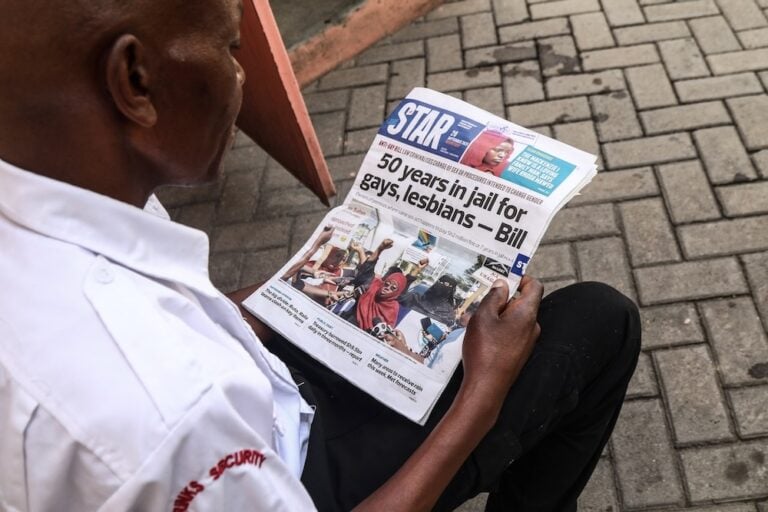(NDIMA/IFEX) – A lobby group operating under the wing of the Catholic Church in Kenya wants three books withdrawn from the school syllabus, saying they are “morally objectionable.” The lobby group, Parent’s Caucus, claims that sections of Nigerian novelist Chinua Achebe’s “A Man of the People” and S. A. Mohammed’s “Kiu” and “Kitumbua Kimeingia Mchanga” […]
(NDIMA/IFEX) – A lobby group operating under the wing of the Catholic Church in Kenya wants three books withdrawn from the school syllabus, saying they are “morally objectionable.”
The lobby group, Parent’s Caucus, claims that sections of Nigerian novelist Chinua Achebe’s “A Man of the People” and S. A. Mohammed’s “Kiu” and “Kitumbua Kimeingia Mchanga” – all set-books for the Kenya Certificate of Secondary Education Examinations (KCSE) – are sexually explicit and contain pornographic material.
The lobby group has collected over 2,000 signatures from parents in the Kenyan capital, Nairobi, and the neighbouring district of Kiambu. The signatures are to be presented to the Ministry of Education. Parent’s Caucus, in conjunction with the Catholic Church, is urging parents to append signatures to a protest note entitled, “Help Kick Pornography Out of the Classroom”, to be sent to the government.
Education Minister George Saitoti said the government was not to blame and promised a review of the books.
Achebe is a revered literary icon who is widely acknowledged as one of the greatest writers ever to come out of Africa. His book “A Man of the People” was published in 1966 and, until now, no objection has ever been raised on account of any alleged sexual content.
“A Man of the People” describes a fictional post-colonial African state. It tackles the issues of political representation in a corrupt state and the problems of an ethnically diverse, economically stratified nation. It also deals with the corruption, immorality, exploitation, hunger for power and ever-present threat of political instability that define the newly-independent African state.
The other two books targeted for alleged sexually explicit material are in Kiswahili, the Kenyan national language. Mohammed’s works may not be as well known as Achebe’s, but all three titles are noted principally for their socially redeeming themes, which is why they were chosen as literary set-books.
If it succeeds, the campaign to strike the three novels off the school’s reading lists could throw next month’s national secondary school examinations into disarray.
The call by the lobby group and the church for the banning of the set-books has met with stiff opposition from literary critics and thespians. They have been quick to point out that two of the books have been taught in secondary schools before, and students were not negatively affected. “A Man of the People” was taught in the 1970s without protest, as was “Kiu” in the mid-1980s. A top thespian, Albert Wandago, said the call by the Catholic Church has no basis. In a statement, Wandago said such a move sets a dangerous precedent, arguing the books were used in secular institutions. He added that unlike the Islamic “madrassas”, where only religions material was allowed, secular schools cannot avoid such literature.
Emmanuel Ngugi, of the Holy Family Basilica-Nairobi, where the appeal for signatures was made in the presence of Kenyan President Mwai Kibaki and the education minister on 31 August 2003, says the church is “the conscience of society and must stand up to be counted.” He objects to the language used in the books, saying it is obscene and immoral. “There is nothing morally redeeming in the female characters in the book, who are merely portrayed as sex objects,” he says of “A Man of the People”.
Those pushing for the ban on the books have selected excerpts from “A Man of the People” that they say are clearly explicit and are likely to excite the students’ imaginations and stir their sexual desires. One parent said, “It is astounding the kind of literature we are exposing our children to in classrooms. In fact, it is quite demeaning to women for a man to think that they can only be recognised or are at their best only in a sexual relationship.”
Educators, on the other hand, take the opposite view and are accusing the church of overstepping its mandate. Professor Henry Indangasi, a senior lecturer from the University of Nairobi’s Literature Department, said he is convinced that the critics of Achebe’s book are wrong and are deliberately misinterpreting certain sections in the book to suit their position. “Achebe is not telling his readers to behave like the characters, but wants them to learn from the book. People who treat women as sexual objects and then gloat about it exist in society. It is the failure to teach girls that such men exist, and that they should be on the lookout for them, that is the problem,” he said.
An author who sought anonymity said the church has no business trying to comment on issues that should be left to academia. “The view that the books are pornographic just because they mention sex is myopic and totally uninformed. There are very many passages in the Bible mentioning and describing sex, yet the church has never advocated for those sections to be removed, or for the Bible to be banned,” he said.


